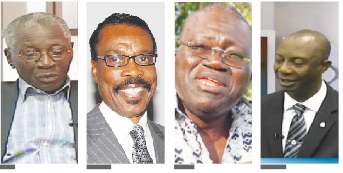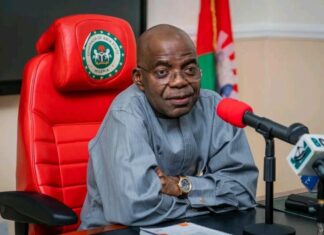Fuel subsidy should be scrapped; that is the groundswell of opinion. It gulps billions of dollars yearly, enriches marketing cabals who defraud the treasury, and does not benefit the common man.
With a sharp drop in oil revenue, huge subsidy claims, and over N12 trillion national debt, the scheme is no longer sustainable.
 Analysts like Biodun Adedipe of Economic Associates; Biodun Aremu, First Vice President of the Nigeria Labour Congress (NLC); and others go against the grain to argue that fuel subsidy never existed in the first place.
Analysts like Biodun Adedipe of Economic Associates; Biodun Aremu, First Vice President of the Nigeria Labour Congress (NLC); and others go against the grain to argue that fuel subsidy never existed in the first place.
Nevertheless, the question is, how can Abuja scrap fuel subsidy without tears for the man on the street considering a weak naira to dollar exchange rate?
Strengthen naira first
Henry Boyo, an economist and industrialist, told TheNiche that subsidy removal has become almost inevitable but first the naira has to be strengthened against the dollar for citizens not to be negatively affected.
“That’s the only benign way the government can remove subsidy without tears for ordinary Nigerians. Any other way will lead to inflationary pressure across sectors of the economy,” he stressed.
He noted that whenever the naira exchange rate depreciates, the price of fuel skyrockets, citing recent instances when fuel price jumped locally even as crude oil price crashed on the international market.
Hard choices to boost economy
In his own view, Adedipe said if the government wants to strengthen the economy and living conditions, there are hard choices to make, among which is the removal of fuel subsidy, fixing power supply, reduction in the number of aides to political office holders, and other measures to plug leakages in resources.
Financial Derivatives Managing Director and Chief Executive Officer, Bismarck Rewane, said removal of subsidy will partly help to strengthen foreign exchange (forex) reserves and improve naira to dollar exchange rate.
According to him, if subsidy is removed import bills will drop by a minimum 20 per cent, which, if added to the 26 per cent devaluation of the naira, will ensure equilibrium for the currency without need for its adjustment.
“Even if you are going to carry out more adjustments, it will be minimal. But if you try to put administrative controls or try to adjust the currency ahead of the subsidy issue, then you will have distortions.
“Those distortions are what we’re facing right now,” Rewane explained on a television programme.
Once subsidy is resolved, he argued, the demand for hard currency will drop and the government will have more dollars to meet demand at the forex market, which in turn may strengthen the naira.
Aremu told TheNiche that fuel subsidy has turned out to be an economic terrorism against average Nigerians, having been distorted and exploited by cabals to enrich themselves.
In his view, political leaders are living off subsidy – free fuel, meals, dresses, and all forms of allowances – whereas ordinary Nigerians never get to enjoy any form of subsidy.
Subsidy was appealing initially, he said, but it was later hijacked by cabals.
Negative impact of dual wage system
Aremu added that Labour is advocating a total review of the wages and remunerations of politicians to address the scandalous dual wage system the government has created – one for the political elite and the other for civil servants.
His words: “The country must put an end to the dual wage system in which the wage package for political office holders is extraordinary, outlandish and therefore encourages do or die politics.
“The situation where the salary of a university professor, the highest academic attainment, is N6 million per annum and a legislator earns N600 million per annum beats all logic.
“The work of a legislator cannot be more tasking than that of a university professor. But the pay package of a legislator suggests that he can conveniently afford to engage 100 professors on paid employment.
“This is partly why the value of education is gradually being eroded in preference for politics. We must stop this misnomer if government leadership really wants to effect a change in the system.”
Cutting corruption
Capital Oil and Gas Chairman, Ifeanyi Ubah, recently urged President Muhammadu Buhari to immediately remove fuel subsidy and urged the public to support deregulation, as subsidy removal will ensure the lowest price of petroleum products.
Said he: “I have always been of the view that we should deregulate so that we can cut corruption but unfortunately Nigerians didn’t take it from [former President Goodluck] Jonathan. I urge Buhari to take a bold step and deregulate the oil sector.
“There’s no point paying subsidy when Nigerians are not benefiting from it. The president will be doing the right thing if he deregulates the sector so that the product will be sold at cheaper rate in the future.”
Suffer now, enjoy later
Murphy Erhirhie, Amee Global Services Managing Director, said: “Subsidy removal will eventually benefit everyone if it is removed.
“It might seem like punishment but I will advise we suffer now and enjoy later, after all we have bought fuel for N200 per litre at some point when there was scarcity.
“At this point the removal is non-negotiable.”
Eliminate waste, redirect resources
The All Progressives Congress (APC) Transition Committee, whose report is expected to influence the policy direction of Buhari, recommended that fuel and kerosene subsidy be scrapped immediately.
The official price of kerosene is N50 per litre but end users pay as much as N150 despite subsidy, which turns out to be a source of massive illegal wealth for fuel import contractors and marketers.
The committee also asked Buhari to privatise the four refineries by adopting the model of the Nigerian Liquefied Natural Gas (NLNG).
NLNG is jointly owned by the Nigerian National Petroleum Corporation (NNPC) with 49 per cent, Shell Gas B.V (25.6 per cent), Total LNG Nigeria (15 per cent), and Eni International (10.4 per cent).
But NLNG is not managed by the government, unlike the refineries which are solely run by the NNPC.
APC Transition Committee Chairman, Ahmed Joda, said the recommendations are intended to “eliminate waste and redirect resources to fuel development, growth and job creation.”
Attempts by Jonathan to remove fuel subsidy in 2012 met with nationwide protests amid allegation of scam in payment to marketers running into trillions of naira.
Jonathan had to retain the subsidy.













